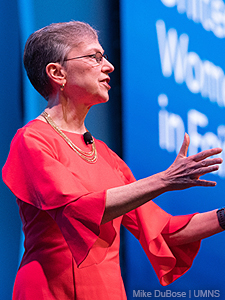
Blog
A Christmas Reflection
by Harriett Jane Olson, General Secretary and CEO of United Women in Faith

I couldn’t get the contrast out of my mind. Right there, in the middle of Isaiah 9:2–7, a passage redolent of Handel’s beautiful Messiah, are references to war, spoils of war, and military victory. It seems so incongruous with our Christmastime celebration of love and light, the quiet outside of Bethlehem, and the wonder of a baby born to Mary. And yet . . .
The battle referred to as the day of Midian (v. 4) was not waged like any war we could imagine. As the story is told in Judges 6–8, a reluctant leader—a youngest son from the smallest tribe—hears God’s call to action. Gideon calls for troops and when they arrive, God tells them that there are too many. First 23,000 are sent home, then more, until only 300 remain. They take the city with a blare of trumpets and the glare of light in the dark of night. The aftermath is bloody still, but the understanding is that God’s strategies are not our strategies and that the work that God does at the hands of the faithful is not limited by what we perceive as weakness. Perhaps we can remember this as we see the fragility of the church, or the people we trusted, and even as we see the work ahead to grow the giving and the membership and, thus, the impact of our own organization. God’s call is for the benefit of the community and frailty—the frailty of the baby in the manger or the troops armed with trumpets rather than swords—is not the barrier we might think it is.
Asking for a Sign
Gideon also repeatedly asks for a sign to confirm that it is really God who is speaking. This is not the easy, confident trust of a person without doubts or questions, but the very relatable journey of a fallible person. Just as God does when Mary asks in faith about how God will accomplish what the angel has said, God responds to Gideon’s requests.
Another thing we might reflect on in this Christmas season is how often God choses the unlikely person. The younger son, the peasant girl, the shepherds. You and I might also be unlikely persons to see and hear God’s promises of love and peace, but it’s a good time to ask ourselves where we might serve in the work that God is doing in the world. Our resources may be small, and our abilities limited, but God’s are not. How are we part of the reign of justice and blessing that Jesus came to announce?
In the day of Midian, God’s choices were confounding. God abjured what looked like strength and chose the unlikely leader. In coming to earth as fully God and fully human in Jesus Christ, God’s choice of vulnerability was confounding. However, God does not come just to conquer Rome, but to call people to devotion to God and to the work of caring for each other that leads to justice and joy for the whole world.
Community of Care
In that community of mutual care and justice, Isaiah says that the burden of oppression is lifted (v. 4) and the people rejoice. Notice that the images used for rejoicing are images of the community (v. 3)—the nation rejoicing with joy at the harvest (not just the farmer, but “they” rejoiced). Also, they rejoiced as those who share in the plunder of war. Again, a shared celebration, perhaps carrying the sense of recompense for what has been lost to war and oppression. Wrongs righted.
Isaiah heralds the coming reign of justice with the promise that peace will come, be established and sustained by justice and righteousness (v. 7). Of course, all of this is echoed in Mary’s Magnificat (Luke 1:46–55) as she refers to what God has done by “the strength with his arm” raising up the lowly and sending the rich away empty, just as Isaiah credits the “zeal of the Lord of heavenly forces.”
This Christmas, let us keep our eye on God’s project in the world, marvel at the light and love and peace we can see, and prepare ourselves for the work to come by participating with God and our community to renew the creation and fulfill the promise of salvation.
May Christmas joy sweeten our work and deepen our vision of justice, as well as our sense of the good news that was born that holy night.

